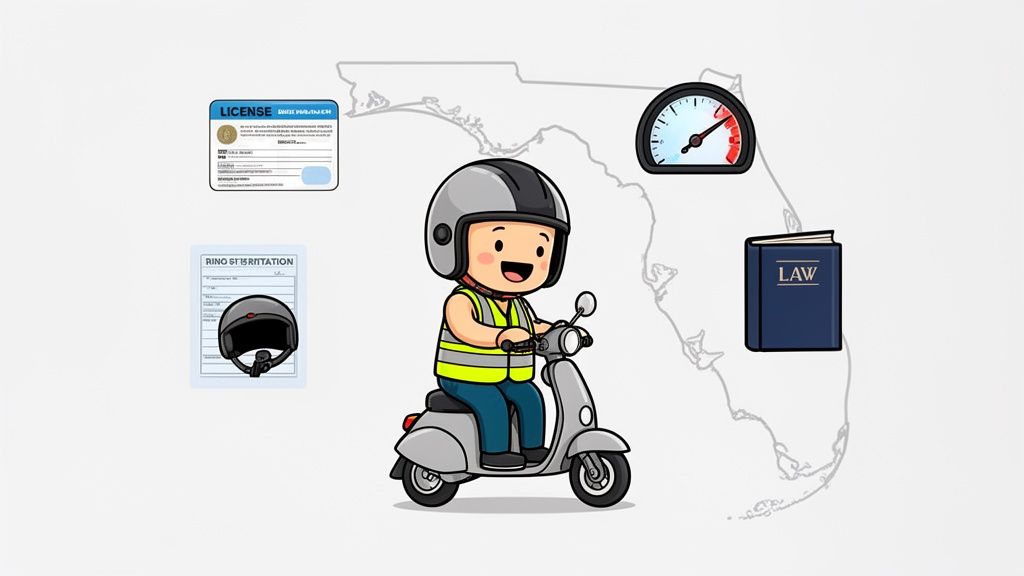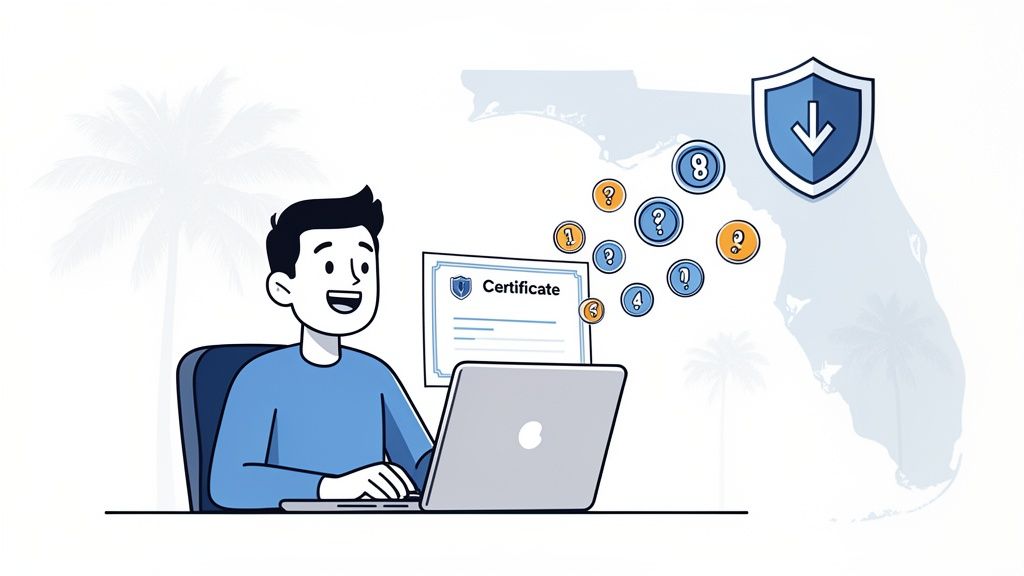Renewing your Florida driver’s license doesn’t have to be a headache. At its core, you’ll need your current license, some proof that you still live in Florida, and the renewal fee. The real question is how you’ll get it done. You’ve got options: online, in person, or by mail.
Just keep in mind, if you’re upgrading to a REAL ID for the first time, you absolutely have to show up in person. No exceptions.
Your Florida License Renewal Checklist
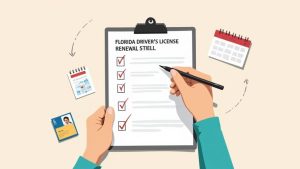
Before you even think about booking an appointment or logging into a website, let’s figure out the right path for you. A few minutes of prep now can save you a ton of time and prevent that dreaded second trip to the service center. The first thing to determine is whether you can take the easy route—renewing online—or if a trip to the tax collector’s office is in your future.
It really boils down to a few key questions:
- How did you renew last time? Florida often lets you renew online every other time. So, if you went in person for your last renewal, you might be in luck for an online one now.
- Do you have a REAL ID? Take a look at your current license. Is there a little gold star in the upper right corner? If not, you’ll need to make an in-person visit to get that sorted.
- What kind of license do you have? If you’re a Commercial Driver License (CDL) holder, your renewal process is a bit more involved and often requires an in-person visit.
Getting these things straight from the start is a huge help. It’s all part of how states manage the massive number of drivers on the road—which, as of 2025, is over 242 million in the U.S. alone. This is why they have specific hoops to jump through, like document checks and vision tests, to keep everyone safe. If you’re curious about national driving trends, the data from Hedges & Company is pretty insightful.
Choosing Your Renewal Path
So, which way should you go? If you’re eligible, renewing online is by far the fastest and most convenient method. You can knock it out in minutes from your couch, provided you have a valid, REAL ID-compliant license and don’t need a new photo.
However, an in-person visit is non-negotiable for some folks. You’ll have to go in if you’re getting your first REAL ID, have certain medical flags on your record, or have changed your name since your last license was issued. Think of this initial check as your personal roadmap to a smooth, one-and-done renewal.
Florida License Renewal Options At a Glance
Feeling a bit overwhelmed by the choices? This simple table breaks down the three main renewal methods to help you quickly decide which one fits your situation best.
| Renewal Method | Who It’s For | Key Consideration | Typical Timeframe |
|---|---|---|---|
| Online | Drivers who renewed in-person last time and already have a REAL ID-compliant license. | The fastest and most convenient option if you’re eligible. | 5-15 minutes |
| In-Person | First-time REAL ID applicants, those who need a new photo, or have a name change. | An appointment is highly recommended to avoid long wait times. | 30-90 minutes |
| By Mail | Florida residents temporarily out-of-state for military, work, or school. | Requires you to request a renewal packet ahead of time. | 2-4 weeks |
Ultimately, picking the right method comes down to your personal circumstances. A little planning goes a long way in making this a quick and painless task.
Getting Your Renewal Documents in Order
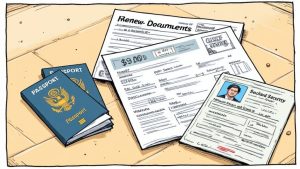
Nothing brings a trip to the tax collector’s office to a screeching halt faster than showing up with the wrong paperwork. I’ve seen it happen countless times. To make your in-person renewal a breeze, think of your documents in three simple piles: proof of identity, proof of address, and your Social Security number. Getting these right the first time is the secret to a quick, painless visit.
For proving who you are, you’ll need one primary document. A valid, unexpired U.S. passport is the easiest option by far. If you don’t have one, an original U.S. birth certificate or a Certificate of Naturalization will also do the trick. Just know that they need to be originals or certified copies—photocopies won’t fly.
Proving You’re a Florida Resident
Next up, you have to prove you actually live in Florida. This is where many people get tripped up because you need two separate documents showing your current residential address. The key is that they must come from two different sources and clearly list your name and street address.
Here are some of the most common options people use:
- Utility Bills: A recent electric, water, or cable bill is a great choice.
- Vehicle Paperwork: Your Florida vehicle registration or title certificate works perfectly.
- Official Mail: Think voter registration cards, mail from your bank, or letters from any government agency.
You can absolutely mix and match. For instance, you could bring a recent bank statement and your car registration. Just make sure the documents are current—usually within the last two months.
Having your documents ready is one thing, but a clean driving history is just as crucial. It’s always a good idea to check your record for any outstanding tickets or points that could complicate your renewal. You can find out more on how to check your driving record to make sure there are no surprises waiting for you.
Verifying Your Social Security Number and Name Changes
Finally, you need to prove your Social Security number. Your original Social Security card is the most direct way to do this. Can’t find it? No problem. A W-2 form, a recent pay stub, or a 1099 form will also work, as long as it shows your full number.
Now, what if your name has changed? If you’ve gotten married, divorced, or had a legal name change for any other reason, you’ll need to bring the official document that links your old name to your new one. This could be a marriage certificate or a court order. If you’ve changed your name more than once, you have to show the paper trail for each change.
Don’t forget about your eyes! A current vision test is another key part of the renewal process. To get a clear picture of the official DMV vision test requirements and find a location, this resource is incredibly helpful.
Choosing Between Online and In-Person Renewal
Deciding whether to renew your driver’s license from your couch or at a service center really comes down to your specific situation. While renewing online is a huge time-saver, it’s not a universal option. Knowing the difference can save you a ton of frustration.
The easiest route, by far, is using Florida’s MyDMV Portal. If you renewed in person last time and your picture is still up-to-date, you’re likely in the clear. Just log in, confirm your details, pay the fee, and wait for your new license in the mail. It’s about as painless as it gets.
But some things just have to be done in person—no exceptions. This is definitely the case if you’re upgrading to a REAL ID for the first time or if you have a Commercial Driver License (CDL), which comes with its own set of rules.
When You Have to Renew in Person
Certain things will automatically require a trip to a local service center. My best advice? Schedule an appointment. Trust me, it’s the only way to avoid those infamous wait times.
You’ll need to head to an office if any of these apply to you:
- You’re due for a new photo. Florida makes you take a new one every 16 years.
- A vision test is required. They’ll conduct this on-site as part of the process.
- You’re getting your first REAL ID. This is a federal thing, so they have to verify your documents in person.
- You’ve legally changed your name. Bring your marriage certificate or court order to make it official.
The in-person visit is more than just a formality; it’s a critical check-in to ensure all your information is current and meets state and federal standards. It’s a core part of the requirements to renew your driver’s license.
This infographic really helps clarify which path you should take.
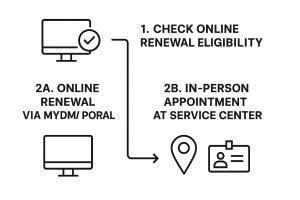
As you can see, the visual breaks it down pretty simply. For some drivers, maintaining a valid license might also involve taking a driver improvement course. If that sounds like you, it might be worth exploring an online driving course in Florida to learn more.
Fees, Deadlines, and What Happens If You’re Late

Let’s talk about the practical side of things: how much this will cost and when you need to get it done. Staying on top of the deadlines is just as important as having the right documents, and thankfully, Florida makes it pretty straightforward.
Know Your Renewal Window
You get a pretty generous window to get your license renewed—Florida lets you start the process up to 18 months before it expires. With that much lead time, there’s really no good reason to cut it close.
If you do miss your expiration date, don’t panic, but don’t drive, either. Driving with an expired license is a surefire way to get a ticket. What might seem like a minor oversight can quickly turn into a non-criminal moving violation if you get pulled over.
Getting caught means more than just a fine; it’s a citation that adds points to your driving record. It’s an expensive and completely avoidable mistake.
The Real Cost of Driving on an Expired License
The penalties for driving on an expired license go beyond a simple ticket. If you’re involved in an accident, even a minor one, the legal and financial fallout can get serious fast.
Every citation adds points to your license. If you’re curious about how that works, you can find a good breakdown of how the state tracks https://bdischool.com/florida-points-on-license and what it means for your insurance rates. Those points can stick around for years, costing you a lot more in the long run.
The best advice? Just renew on time. It saves you from fines, points, and the stress of a potential court date.
Florida Driver’s License Renewal Fee Schedule
The cost to renew is fairly standard, but a few things can change the final amount you pay. Here’s a quick look at the fees for a standard Class E license.
| Fee Type | Cost | Notes |
|---|---|---|
| Standard Renewal Fee | $48.00 | This is the base cost for a standard Class E license renewal. |
| Late Fee | $15.00 | This is added to your renewal cost if your license is already expired. |
| Online Convenience Fee | ~$2.00 | A small processing fee charged by the third-party vendor for online payments. |
Keep in mind that if you renew in person at a county tax collector’s office, they may also charge a $6.25 service fee. The easiest way to avoid extra costs is to renew on time and check your payment options ahead of time.
What If My Renewal Isn’t Standard?
Life isn’t always straightforward, and neither is renewing your driver’s license. Your situation might not fit the typical mold, especially if you’re a new resident, serving in the military out of state, or a non-U.S. citizen. Knowing how to navigate these specific scenarios is the key to getting it done right.
Moving to Florida? It’s a Transfer, Not a Renewal
If you’ve just moved to the Sunshine State, welcome! One of the first things on your to-do list is swapping your old out-of-state license for a Florida one. Think of this less as a renewal and more as a brand-new application. You’ll need to head to a service center in person with all the standard proof of identity, Social Security number, and two proofs of Florida residency.
This is a path many are taking. In the first half of 2025 alone, Miami-Dade County saw a 22% spike in these out-of-state license exchanges compared to before the pandemic, with a lot of new faces coming from places like California and Texas. You can dig into the data behind this trend over at MIAMI REALTORS®.
Military Members Stationed Elsewhere
Florida recognizes that serving your country often means you can’t just pop into a local tax collector’s office. If you or your spouse are active-duty military stationed outside of Florida, there’s a special provision for you. In most cases, you can handle your renewal entirely by mail, which is a huge help when you’re deployed or living on a base across the country.
Renewals for Non-U.S. Citizens
For non-U.S. citizens, the renewal process is directly tied to your legal presence in the country. You’ll need to provide original documents from the U.S. Citizenship and Immigration Services (USCIS) to prove your status.
Your Florida license will generally expire when your immigration documents do, so keeping everything current is essential. Be prepared to bring one of the following with you:
- Permanent Resident Card (Form I-551)
- Valid Employment Authorization Card (Form I-766)
- Proof of nonimmigrant classification (Form I-94)
The Bottom Line: Whether you’re a new Floridian, serving in the armed forces, or here from another country, there’s a specific process for you. The trick is to figure out which one applies before you start. Gathering the right paperwork ahead of time will save you a ton of hassle and a potential second trip to the service center.
Your Top Renewal Questions Answered
Even with a plan, a few questions always seem to pop up during the renewal process. Let’s walk through some of the most common ones I hear so you can feel confident heading into it.
What if I Miss My Renewal Deadline?
Forgetting to renew on time can be a real headache. The moment your license expires, it’s technically invalid, and driving could get you a ticket. Florida does give you a bit of a grace period to get it sorted out, but it’s always best to renew within that 18-month window before it expires.
If you let it slide for more than a year, things get more complicated. You’ll likely have to start over and retake both the written knowledge test and the road skills test. Trust me, it’s much easier to just handle it on time.
Renewing from Afar or Abroad
What if you’re not in Florida when your license is due for renewal? If you’re a college student or a military member stationed elsewhere, you’re in luck. Florida has a mail-in option for residents who are temporarily out of state. The catch is, you can’t use this if it’s time for a new photo or if you’re upgrading to a REAL ID for the first time—both of those require an in-person visit.
For those traveling internationally, remember that your Florida license might not be enough. Many countries require U.S. citizens to carry an International Driving Permit (IDP) alongside their state license. Think of it as a translation of your license for foreign authorities. You can learn more about getting one on the official U.S. government website.
One thing to keep in mind: while a REAL ID isn’t legally required to drive in Florida, you’ll need one to fly domestically or enter federal buildings. If your license doesn’t have that gold star, your renewal is the perfect time to upgrade. Just be prepared to bring extra documents for that in-person appointment.
If you ever feel a little rusty on the rules of the road, the official state handbook is your best friend. For a quick and easy summary, check out our guide on the Florida driver’s manual.
At BDISchool, we’re here to help you stay safe and compliant on the road with our state-approved online courses. Whether you need to handle a traffic ticket or just want a refresher, our programs are built to fit your schedule. Learn more at https://bdischool.com.

